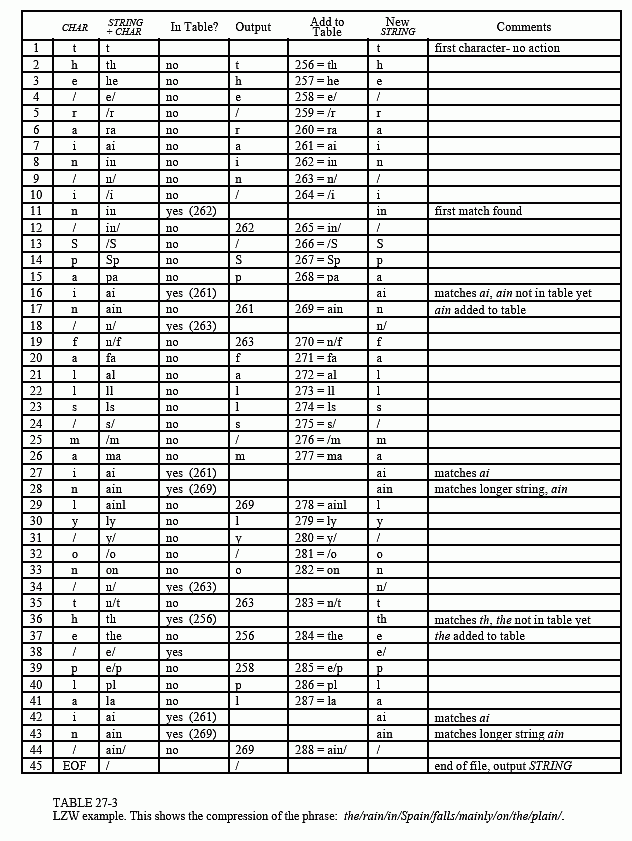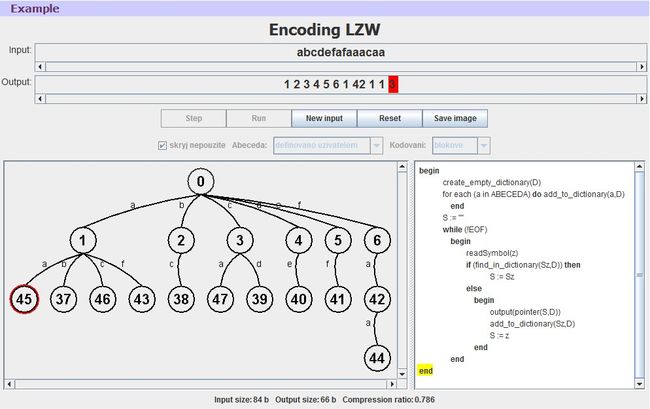LZW压缩算法——简明原理与实现
LZW和哈夫曼编码一样,是无损压缩中的一种。该算法通过建立字典,实现字符重用与编码,适用于source中重复率很高的文本压缩。本文首先讲下LZW的编解码原理,然后给出LZW的实现code。
*********************原理*********************
编码:
- 编码0-255用来存储Ascii码为[0,255]的字符,放在字典里。
- 编码从256开始,将出现过的字符计入字典
- 核心思想:利用字符的可重用性,每当往结果输出一个编码,就将一个新的string存入dictionary
算法流程:
举例:
解码:
编码的逆过程,若编码是string到int的映射,我们可以将解码过程描述为int到string的映射。
- LZW算法的解码无需在编码过程中存储字典(这样太浪费空间了)
- 解码初始化依旧用256个Ascii码,后面每读入一个编码(int),检查其在dictionary中的映射,并不断将新的映射加入字典
算法流程:
解码的例子建议读者用下面的代码直接调试吧~
*********************实现*********************
我用C++实现的,Compress和Decompress两个函数分别实现编解码
/************************************************************************/
/* File Name: LZW.cpp
* @Function: Lossless Compression
@Author: Sophia Zhang
@Create Time: 2012-9-19 10:00
@Last Modify: 2012-9-19 11:10
*/
/************************************************************************/
#include"iostream"
#include "map"
#include "string"
#include "iterator"
#include "vector"
using namespace std;
/************************************************************************/
/* Compress Module
* input:
str - the string need to be compressed
result - compress result
*/
/************************************************************************/
template<typename TypeIterator>
TypeIterator Compress(string str, TypeIterator result)
{
//Build the dictionary
map<string,int>dictionary;
int Dictsize=256;
for(int i=0;i<Dictsize;i++)
dictionary[string(1,i)]=i;
char z;
string S;
for(string::const_iterator it = str.begin(); it!=str.end(); it++)
{
z = *it;
if(dictionary.count(S+z))//can find S
S+=z;
else//S is not in dictionary D
{
*result++ = dictionary[S]; //output pointer (S,D)
dictionary[S+z] = Dictsize++; //add to dictionary
S = z;
}
}
if(!S.empty())
*result++ = dictionary[S];
return result;
}
/************************************************************************/
/* Decompress Module
* input:
TypeIterator result - compression result, to be decompressed
*/
/************************************************************************/
template<typename TypeIterator>
string Decompress(TypeIterator result)
{
map<int,string>inv_dictionary;
int Dictsize=256;
for(int i=0;i<Dictsize;i++)
inv_dictionary[i] = string(1,i);
char z;
string S;
string entry;
string res;
Dictsize--;//because the first "Dictsize++" make no sense, it has only one char in [0,255]
for(TypeIterator::iterator it = result.begin(); it!=result.end(); it++)
{
int k = *it;
if(inv_dictionary.count(k))
entry = inv_dictionary[k];
else if(k==Dictsize)
entry = S+ S[0];
else
throw "Bad compression code";
res += entry;
inv_dictionary[Dictsize++] = S + entry[0];
S = entry;
}
return res;
}
int main()
{
typedef vector<int> TypeIterator;
TypeIterator compress_res;
string S = "the/rain/in/Spain/falls/mainly/on/the/plain";
Compress(S,std::back_inserter(compress_res));
// copy(compress_res.begin(),compress_res.end(),std::ostream_iterator<int>(std::cout,","));
// std::cout<<std::endl;
//output the compressed result
for( TypeIterator::iterator it= compress_res.begin(); it!=compress_res.end(); it++)
cout<<(*it)<<endl;
//decompress the compressed result
string decompress = Decompress(compress_res);
cout<<decompress<<endl;
}
result:
Reference:
1. http://www.stringology.org/DataCompression/lzw-e/index_en.html
2. http://www.dspguide.com/ch27/5.htm
3. http://marknelson.us/1989/10/01/lzw-data-compression/
4. http://www.ccs.neu.edu/home/jnl22/oldsite/cshonor/jeff.html
关于Compression更多的学习资料将继续更新,敬请关注本博客和新浪微博Sophia_qing。




